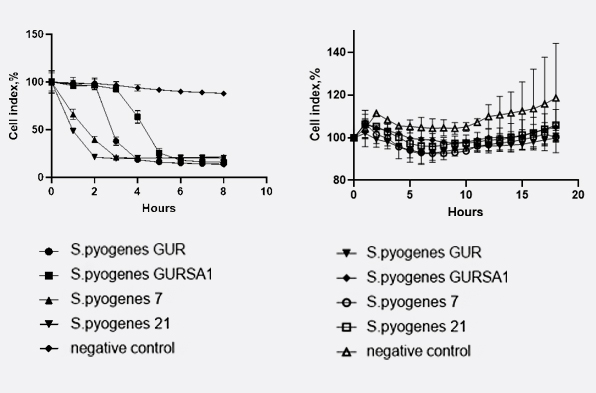
Novel insights from studies of unique bacterial strains
Specialists at the Microbial Therapy Research Department of the WCRC for Personalized Medicine earlier isolated unique Streptococcus pyogenes (S. pyogenes) strains, M49 and M111, with oncolytic properties in the cells of hepatoma, sarcoma, pancreatic and brain cancers. The surface structures of strains have a cytotoxic (damaging) effect on tumor cells.
However, studies were needed to investigate the possibility of using live bacterial cells for the treatment of tumors. The toxicity of oncolytic S. pyogenes against normal cells was studied in the in vivo system and in vitro on the model of a cell line of normal human fibroblasts.
The studies were carried out using the modern xCELLigence real-time cell monitoring system. The results showed that the studied oncolytic S. pyogenes had no cytotoxic effect in normal human cells, suggesting safety of the strains and high potential for their use in living systems.
The figure on the left (brain cancer cells) shows a decrease in the number of living cells when exposed to live bacterial cells, and in the figure on the right (normal cells) the number of living cells does not change during the entire observation period. For more details, please read the published article.
Chernov A. N., Tsapieva A. N., Alaverdian D. A., Filatenkova T. A., Galimova E. S., Suvorova M. A., Shamova O. V., Suvorov A. N. In Vitro Evaluation of the Cytotoxic Effect of Streptococcus pyogenes Strains, Protegrin PG-1, Cathelicidin LL-37, Nerve Growth Factor and Chemotherapy on the C6 Glioma Cell Line. Molecules. 2022; 27(2):569.
https://doi.org/10.3390/molecules27020569
13.07.2022
